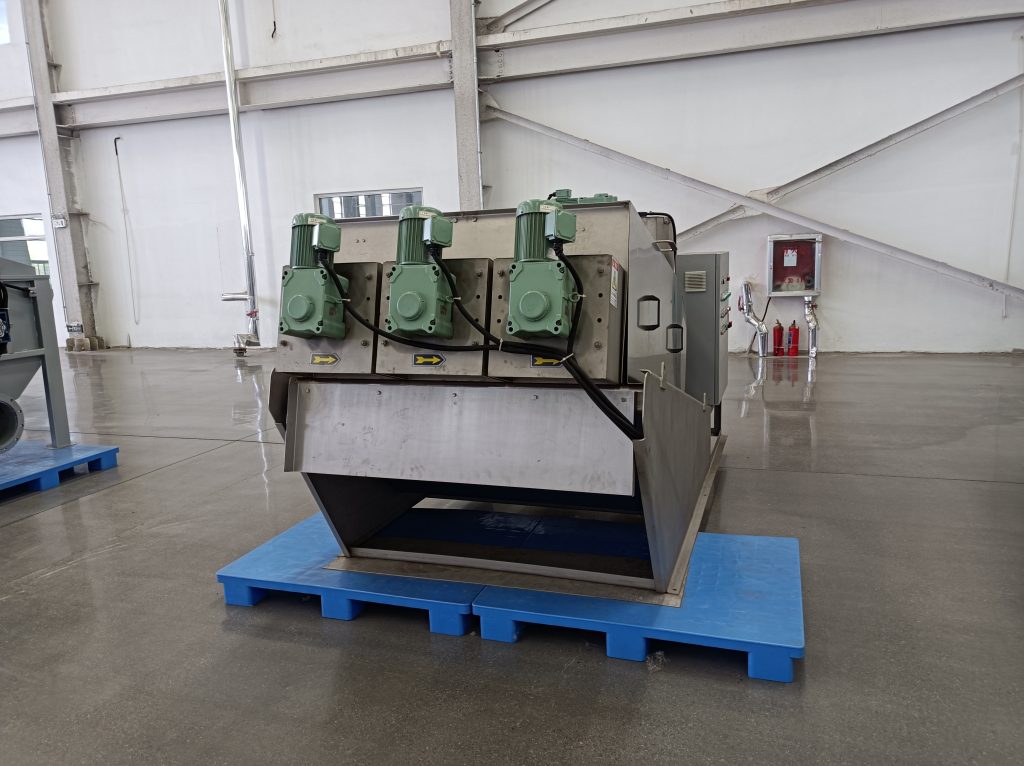Advantages of using multi-disc screw dehydrator
Sewage sludge formed during their mechanical, biological, and physicochemical treatment refers to difficult-to-filter colloidal suspensions, sometimes containing specific inclusions in the form of fats, oils, petroleum products, etc. Currently, the sewage treatment plants (STP) mostly utilize belt filter presses, centrifuges, and multi-disc screw press dehydrators for sludge dehydration.

We are well aware of the common problems associated with equipment maintenance in the water and sewage utilities sector, such as:
the customer rarely pays attention to the cost and availability of spare parts for maintenance and repair. This can lead to service costs equal or close to the purchase of a new piece of equipment;
when choosing equipment for dehydration, the cost of reagents is rarely taken into account, but the difference can be very significant;
sometimes the operating personnel does not participate in the selection of equipment, or their experience and opinion are not taken into account when making a decision;
the attempts to service equipment by local technical services very often fail due to the lack of sufficient qualifications on the customer’s personnel part and lack of the necessary technical equipment.
Therefore, it’s important to take into consideration every detail to make the right decision. We hope that this article will be useful for professionals looking to purchase dewatering equipment, and will help to weigh all the risks and estimate the hidden costs associated with its operation.
COMMONLY USED TYPES OF DEWATERING EQUIPMENT
Dewatering equipment has different advantages and disadvantages, and each is suitable for specific conditions, primarily depending on the type and volume of sludge to be dewatered. So, for example, the use of centrifuges is primarily justified for oil and fat-containing sludge, as well as sludge with a high content of excess activated sludge. That said, it is not recommended to use them when working with sludge containing abrasive inclusions.
The advantages of using belt filter presses are high productivity, which is especially noticeable when working with sludge from primary sedimentation tanks, low energy consumption, and relatively low maintenance and repair costs.
Multi-disc screw dehydrators are the most versatile in terms of sludge types and show excellent results (the content of dry cake mass (further – CM) 18-25%), when working with various types of sludge, including oil and fat-containing sludge, sludge with low or high CM content of the initial sludge deposit, and with sludge containing abrasive inclusions, which determines the overall usability of this equipment.
OPERATING COST OF MULTI-DISC SCREW DEHYDRATOR
Energy use costs
A relatively low speed of rotation of the dehydrator screws is comparable to the low speed of rotation of the shafts of filter presses. As a result, energy consumption in processes that require using these types of equipment is significantly lower than in centrifugation.
Flocculant consumption
Mixing in centrifuges initially takes place in a closed drum at high speeds. Due to this specification, large floccules are often broken into smaller ones. Thanks to the built-in flocculation tank with adjustable, gentle mixing that can be controlled, multi-disc screw dehydrators consume less of this expensive reagent than centrifuges.
The need for rinsing water
After each work shift, all dewatering equipment must undergo a mandatory cleaning procedure for all parts that come into contact with sludge and filtrate. Centrifuge drums must be filled with water to be properly cleaned internally. The multi-disc screw press dehydrator operates by automatically turning on the water pressure and flow for a short period, similar to a conventional water faucet, for no more than three flush valves. The water in the dehydrator is not used to clean the filter holes (as they are self-cleaning anyway). There is only a need to clean the outer surface of the drum from non-flocculated sludge particles.
Dehydration of sludge with a high content of abrasive inclusions
Initial dewatered sludge often contains many abrasive inclusions (this is especially true for the sludge of primary sedimentation tanks). Multi-disc screw dehydrators with their ultra-low rotation speeds are less susceptible to the influence of abrasive inclusions in the sludge, meaning that they can be effectively operated without the risk of potential repair and replacement of drum parts in 5-7 years of operation after start-up.
Noise, vibration, odor spread
Multi-disc screw dehydrators combine all the positive features from other types of equipment – their drums have a similar cover as centrifuges, which prevents the spread of odors in the workshop. Similarly to belt filter presses, screw dehydrators neither make noise nor vibrate during operation (dehydrators do not even have additional noise from rinse sprayers as this is the case in a filter press). Thus, the arrangement of the dewatering premise for the installation of dehydrators will not require additional expense for noise isolation and vibration protection, as well as reinforced ventilation systems with subsequent maintenance of these additional systems.
Process automation
Multi-disc dehydrators are equipped with control cabinets operated through controllers, which enables various algorithms for turning on the dehydration system in automatic mode – depending on the level in the external tank with the initial sludge, at a certain time of the day, at specified time intervals, remotely from an external PC, etc. Automatic processes such as these minimize the need for personnel involved in the maintenance of multi-disk dehydrators and make it easier to integrate MDQ into an automated control system and dispatch system. At the same time, the beginning and end of a work shift for this equipment does not cause “borderline” technological periods, which is typical for other dehydrating equipment, and often creates a number of both technological and operational inconveniences.
Maintenance and repair costs
All types of equipment require the change of oils in the drive geared motors (once every 5–10 years). But unlike a belt filter press, which contains a significant number of shafts in its design with bearing units that need to be lubricated about 3-5 times a year, MDQ multi-disc screw dehydrators do not have rolling bearings at all and do not require a routine relubrication.
For the first 4-6 years of operation, this equipment does not need any servicing of the main working unit – the dewatering drum. After this period, it may be necessary to replace the set of moving rings, which is only 10% of the cost of the equipment, and after 6–10 years of operation, it will be necessary to replace the screw, which may amount to 15–20% of the initial cost of the dehydrator.
Thus, multi-disc screw dehydrators are the most attractive solution in terms of ease of maintenance and overall operating costs. They are the most profitable solution for small and medium-sized wastewater treatment plants due to their lower operating costs.
